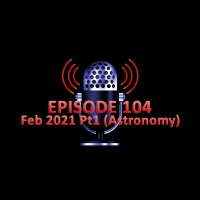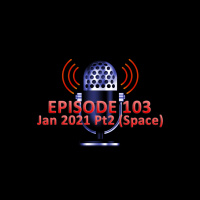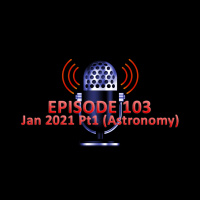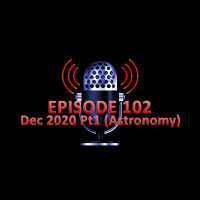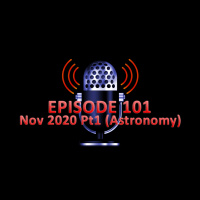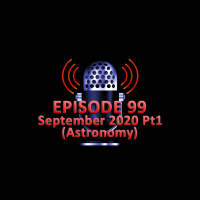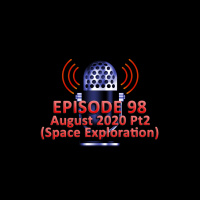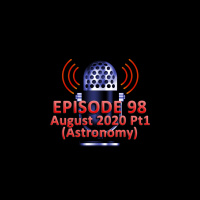Awesome Astronomy
- Autor: Vários
- Narrador: Vários
- Editor: Podcast
- Duración: 272:25:23
- Mas informaciones
Informações:
Sinopsis
Awesome Astronomy explores the frontiers of science, space and our evolving understanding of the universe.Join Ralph, Paul & Jeni for informative and fun astronomy programmes dedicated to space and astronomy news and occasional podcast extras covering hot topics and special interviews in the world of science and astronomy.
Episodios
-
#104 - February 2021 Part 2
14/02/2021 Duración: 01h14minThe Discussion: Correcting the orbits of Jupiter’s moons Welcoming Galaxy Rise’s Dustin Ruoff onto the Podcast Crew Causing terrorism scares with telescopes The News: Rounding up the space exploration news we have: NASA provides more details for its lunar space station plans China’s space station plans Turkey look to become a spacefaring nation The European Space Agency looks for more astronauts The UAE’s Hope Mission & China’s Tianwen-1 make it into Mars orbit Moons of the Solar System: Our new show segment exploring the discovery, exploration and our knowledge of the solar system’s moons. And we begin with Mars’ moons, Phobos and Deimos. Q&A: ‘Will commercial ventures, render SLS useless at some stage?’ From our good friend Steven Sean Spyvee in Leeds, UK.
-
#104 - February 2021 Part 1
01/02/2021 Duración: 01h01minThe Discussion: Jeni on the Highbrow Drivel podcast More astronomy goodness at Sky Guide The amateur astronomy/dogging connection A review of George Clooney’s The Midnight Sky Listener emails about the birth of amateur astroimaging & ‘Arecedos’ The News: Rounding up the astronomy news in February, we have: A hot Jupiter world with a totally transparent atmosphere New research suggest the most abundant stars can fuel photosynthesis Elliptical galaxies forming new stars hundreds of times faster than our Milky Way Citizen scientists creates a 3D map of largely invisible brown dwarf stars Main News story: @ESA’s #CHEOPS satellite looks at a star with exoplanets and finds even more planets in a system that should be able to exist. The Sky Guide: This month we’re taking a look at the constellation of Perseus with a guide to its history, how to find it, a couple of deep sky objects and a round-up of the solar system views on offer in February. Q&A: Are there any other planets in the solar system that cou
-
#103 - January 2021 Part 2
15/01/2021 Duración: 59minThe Discussion: If you like your introductions rambling, you’re in for a real treat! We discuss the Jeni’s PhD thesis submission, The Real Right Stuff documentary on Disney+, Jeni’s foray into book writing and read some listeners questions, which devolves into discussions of whether Queen Elizabeth is Elizabeth I in Canada, the colonisation of the New World, the entertainer Nosmo King and insurance fraud. The News: Rounding up the space exploration news we have: Puerto Rico stumps up funds to decommission and scope out a replacement for Arecibo China opens up FAST Telescope access to other nations Hyabusa 2 asteroid and Chang’e 5’s lunar samples Progress update on the 3 Mars-bound missions & where to follow them SpaceX accelerate Starship rocket production in Texas Q&A: ‘How and where did the Awesome Astronomy team first meet?’ From our good friend Paul Weiler in Pennsylvania USA.
-
#103 - January 2021 Part 1
01/01/2021 Duración: 01h03minThe Discussion: As we welcome in the New Year, we discuss the holiday season and your suggestions to replace the Guide to the Electromagnetic Spectrum section of the show. The News: Rounding up the astronomy news at the beginning of 2021, we have: Finding exoplanets that have a good chance of being able to see us The 'Missing Lithium Problem’ Chasing down the Hubble Constant A new method for detecting exoplanets Was there another dwarf planet in the inner solar system? Main News story: That intriguing radio signal found coming from the vicinity of Proxima Centauri. The Sky Guide: This month we’re taking a look at the great winter constellation of Auriga with a guide to its history, how to find it, a couple of deep sky objects and a round-up of the solar system views on offer in January. Q&A: We know there is a lower temperature limit (absolute zero), but is there an upper temperature limit? From Matt in California.
-
#102 - December 2020 Part 2
18/12/2020 Duración: 01h25minA jolly romp around viruses and tasers! We look back at the astronomy and space exploration highlights of 2020: Phosphine in Venus atmosphere The saga of SpaceX Chang’e 5 at the Moon Comets Atlas & Neowise 3 missions to Mars The lows of 2020 in astronomy and space exploration: Cancellation of SPICA The loss of the Arecibo radio telescope We look forward to the anticipated events of 2021: Luna 25, Chandrayaan-3 & Artemis 1 to the Moon 3 Mars arrivals Vera C Rubin telescope & Maybe JWST And we run through our own predictions for next year before signing off with our customary end-of-year outtakes.
-
#102 - December 2020 Part 1
01/12/2020 Duración: 01h02minThe Discussion: We discuss National Geographic’s The Right Stuff series on Disney+, get a little bit ranty about the use of jokey titles in research papers and read out a few of your emails. The News: Rounding up the astronomy news this month we have: An update to the Geysers on Jupiter’s moon Europa Another asteroid flies scarily close to Earth The latest developments in Muskworld China’s ambitious chang’e-5 mission en-route to the moon Main News story: The Hayabusa 2 mission and the imminent return of samples from asteroid Ryugu The Sky Guide: This month we’re taking a look at the great winter constellation of Orion with a guide to its history, how to find it, a couple of deep sky objects and a round-up of the solar system views on offer in December. Guide to the Electromagnetic Spectrum: In November we concluded our look at the electromagnetic spectrum. But as we now have a new method of detecting events beyond the electromagnetic spectrum, this month we explain gravitational wave astronomy.
-
#101 - November 2020 Part 2
14/11/2020 Duración: 01h04minThe Discussion: The ongoing saga of Jeni’s PhD thesis and a couple of listener emails. The News: Rounding up the space exploration news we have: More destruction to the giant Arecibo radio telescope Keeping in touch with our intergalactic emissaries More information from the Rosettta mission. A new exoplanet characterising spacecraft gets the go ahead form ESA NASA’s Mars sample return mission plans China picks its Mars landing zone for February’s arrival Lockheed propose a new space launch facility in Scotland Main news story: Congratulations to OSIRIS-REx at asteroid Bennu. The Electromagnetic Spectrum: The gamma ray end of the spectrum. How these telescopes were developed and became ever more powerful. Christmas gift ideas: We replace the Q&A section this episode as the holidays are getting closer and we thought you might appreciate some suggestions for the young, new or amateur astronomer in your life.
-
#101 - November 2020 Part 1
01/11/2020 Duración: 52minThe Discussion: Beginning the show droning on about us for bit, we cover Jen presenting her latest paper at the dust conference (yes, there is such a thing) in Marseilles, and filming in the wilds of Wales at night for the BBC’s Weatherman Walking TV programme. The News: Rounding up the astronomy news this month we have: A return to the phosphine on Venus story for an update Earth gets a litterbug mini-moon Water abundance on The Moon The nearest black hole to Earth might not be a black hole after all Citizen science project finds the coolest stars of all in our galactic backyard Main News story: Did humanity narrowly escape extinction in 1908? The Sky Guide: This month we’re taking a look at the constellation of Cassiopeia with a guide to its history, how to find it, a couple of deep sky objects and a round-up of the solar system views on offer in November. Guide to the Electromagnetic Spectrum: In November we conclude our look at the electromagnetic spectrum, what, it is, what is shows us and why it’s so
-
Venus Biosignatures Update Podcast Extra
26/10/2020 Duración: 29minAs the exciting news of phosphine in the atmosphere of Venus turns into a point of contention in the astronomy world, we caught up with the study’s lead scientist Professor Jane Greaves for the inside track. In this interview we discuss: Getting time on a range of professional telescopes time for a risky hypothesis How life could survive in the extreme environment of Venus’ highly acidic atmosphere Floating graphite balloons in Venus’ atmosphere Scientific challenges to this discovery being helpful rather than unwanted Blinding NASA pilots in the name of science
-
#100 - October 2020 Part 2
14/10/2020 Duración: 01h03minThe Discussion: The publication of Jeni’s new research paper, a review of Netflix shows Challenger and Away (sublime and ridiculous). The News: Rounding up the space exploration news we have: ESA and JAXA’s future infrared space telescope cancelled Mercury-bound Bepi-Colombo is passing Venus – with sensors… Get ready for next month’s launch of China’s epic Chang’e 5 moon mission. A change in crew for Boeing’s creed Starliner test flight to the ISS NASA’s shiny new plan for Artemis and human exploration of the moon A gallop through SpaceX’s achievements Main news story: Astrophysicists scoop up Nobel Prizes again this year. The Electromagnetic Spectrum: The ultraviolet and X-ray parts of the spectrum. How these telescopes were developed and became ever more powerful. Q&A: If you had to choose just one mission or big science experiment to proceed in your remaining lifetimes, what would you choose and why? Victor Carroon, London, UK via email.
-
#100 - October 2020 Part 1
30/09/2020 Duración: 01h17minThe Discussion: Helping us celebrate our 100th(ish) episode, we have a live(ish) audience to join in with us. Anna Lanteri from Gröningen University discusses a new Zooniverse citizen science project, called Space Fluff where you can soon classify dwarf galaxies. And Tom Bridgman from the Goddard Space Flight Centre tells us about NASA’s Scientific Visualization Studio. The News: Rounding up the astronomy news this month we have: Astronomers find an exoplanet in another galaxy using x-rays A group of underground liquid water reservoirs found on Mars The first exoplanet observed around a white dwarf star Asteroid Vesta litters other asteroids Main News story: We are finally out of solar minimum and the sun will get more active again. The Sky Guide: This month we’re taking a look at the constellation of Cetus with a guide to its history, how to find it, a couple of deep sky objects and a round-up of the solar system views on offer in October. Guide to the Electromagnetic Spectrum: In this series we take a loo
-
#99 - September 2020 Part 2
15/09/2020 Duración: 01h05minThe Discussion: No time for discussions, we’ve important news to discuss! The News: Rounding up the space exploration news we have: Rocket Lab lowering the cost of small launches SpaceX accelerating development of super heavy lift Vera Rubin Telescope takes a step closer Main news story: A new detection raises the distinct possibility of life in Venus’ upper atmosphere. The Interview: Jeni talks to Dr Emily Drabek Maunder, a co-author on the paper that demonstrates phosphine in concentrations that we can only currently attribute to microbial life in the atmosphere of Venus.
-
Fraser Cain Podcast Extra
10/09/2020 Duración: 01h28minAt your suggestion we did something we should have done years ago and reached out to @universetoday and @AstronomyCast’s Fraser Cain (@fcain) to wax and yarn about all things space and astronomy. We think you'll enjoy!
-
#99 - September 2020 Part 1
31/08/2020 Duración: 01h18minThe Discussion: This month Jeni’s latest paper has a journal reviewer prior to publishing, we take a look at the critical science of cow-cats and a listener brightens our day The News: Rounding up the astronomy news this month we have: Damage to the Arecibo observatory and the prognosis Hubble Helps Uncover the Mystery of the Dimming of Betelgeuse Mars’ water deluge during its habitable phase The search for the missing matter in the Milky Way Main News story: The US National Science Foundation report on the impact of satellite constellations on astronomical science. The Sky Guide: This month we’re taking a look at the constellation of Cygnus with a guide to its history, how to find it, a couple of deep sky objects and a round-up of the solar system views on offer in August. Guide to the Electromagnetic Spectrum: In this series we take a look at the electromagnetic spectrum, what, it is, what is shows us and why it’s so important to astronomers. This month we explain the ultraviolet part of the spectru
-
#98 - August 2020 Part 2
14/08/2020 Duración: 56minThe Discussion: Jen on the radio discussing the Perseids Starlink satellites flaring over our heads TV shows From the Earth to the Moon and For All Mankind Sputnik V Jeni’s latest paper is submitted for journal review Submit your experiences of how diversity is perceived in the amateur astronomy community at tinyurl.com/y28ebdu2 The News: Rounding up the space exploration news we have: Protecting other worlds from our germs and bugs Space Force’s Star Trek-esque logo The Curiosity rover celebrates its 8th year on Mars New Zealand’s Rocketlab pursue reusability Skyrora begin rocket testing in Iceland SpaceX’s Starship prototyping and testing continues Main news story: America gets back to launching people into space Q&A: Will the James Webb Space Telescope actually launch and will it still be worth launching? Lana Visser from Heerenveen in the Netherlands.
-
#98 - August 2020 Part 1
01/08/2020 Duración: 01h05minThe Discussion: This month astrologers are getting upset about their tattoos; why the Babylonians are at fault for ruining the majesty of astrology; Jeni spreads the astronomy word on the BBC; her latest research paper nears peer review; Paul continues promoting space education in schools and we have a chat about sparking science interest in kids. The News: Rounding up the astronomy news this month we have: - ESO image two gas giants orbiting their star - Have we solved the mystery of why the sun’s atmosphere is hotter than the surface? - Using old methods as new measures of the age of the universe - Another way to measure the Hubble constant suggests there may be something a bit strange with our part of the universe or we need new physics to explain it - Unravelling how supermassive black holes form. Main News story: The latest on Comet NEOWISE and how to see it for yourself The Sky Guide: This month we’re taking a look at the constellation of Aquarius with a guide to its history, how to find it, a couple of
-
#97 - July 2020 Part 2
14/07/2020 Duración: 01h11minThe Discussion: What Einstein would have made of an iPhone The goods and ills of social media Free teaching for teachers to teach space and astronomy Jeni talking Pluto on the BBC A trip down technology Memory Lane And get out and look at Comet Neowise! The News: Rounding up the space exploration news we have a Mars launch window and NASA storming ahead with Artemis plans so this month is all about the moon and Mars: The Kennedy Space Centre takes delivery of rocket engines for their SLS rocket Funding for more SLS moon rockets A new lunar rover to help plan human missions New modules for the lunar orbiter NASA innovation funding for new long duration mission capabilities United Arab Emirates’ Mars orbiter launching this month China’s Tianwen-1 Mars mission with an orbiter, lander and rover Main news story: Getting ready to launch the biggest ever rover to Mars The Electromagnetic Spectrum: The visible light part of the spectrum. How telescopes were developed and became ever more powerful. Q&A:
-
#97 - July 2020 Part 1
01/07/2020 Duración: 01h20minThe Discussion: This month Jeni’s getting frustrated with the politics of peer review, Paul’s seen an uptick in noctilucent cloud hunting and public interest in astronomy in general during lockdown. We ask ‘Is Starlink actually a good thing for astronomy outreach and public engagement?’, while Paul wonders if Elon Musk is aware of the fate of the Duke of Buckingham. And we delve into listeners’ emails about the future of AstroCamp in a pandemic and collaborations with other podcasts. The News: Rounding up the astronomy news this month we have: Have gravitational waves revealed the first ‘Black Neutron Star’? Jen sees the error of her ways about Betelgeuse’s recent dimming Odd white spots on Saturn’s moon Titan could be dried up methane lake beds Hunting for the first ever stars in the universe CERN’s next generation supercollider Main News story: Has NASA discovered parallel universes? The Sky Guide: This month we’re taking a look at the constellation of Sagittarius with a guide to its history, how to fin
-
#96 - June 2020 Part 2
15/06/2020 Duración: 01h10minThe Discussion: Struggling to get the media excited about astronomy How history will record the clusterf**k that is 2020 Skyrora looking to join the smallsat launch market SpaceX’ Teletubby costumes The News: Rounding up the space exploration news this month we have: Starship prototype goes Kablooey Britain returns to rocketry Goodbye to Japan’s ISS resupply spacecraft The European Space Agency look to ‘natural resources’ for moonbases Virgin Orbit attempt to slash the cost of launching to Low Earth Orbit NASA chooses 3 commercial consortia to develop lunar landers Main news story: American commercial crewed launches have finally arrived Q&A: Will the Lunar Gateway be visible from Earth? From Alex Bell @BLT_Astro on Twitter. The Electromagnetic Spectrum: The near and mid-infrared part of the spectrum. How it became so important for astronomy and by whom.
-
#96 - June 2020 Part 1
01/06/2020 Duración: 01h08minThe Discussion: The wonderful generosity of amateur astronomers trying to get the name Pair Instability Supernova changed to your suggestions Jen’s talk for Café Scientific, which you can watch here Jeni talking about SpaceX’ historic crewed flight with the BBC History 101 and looking forward to Space Force on Netflix What beginners should and shouldn’t do to get started in stargazing The News: Rounding up the astronomy news this month we have: The first galaxies seemed to form in about half the time we originally thought Finding the nearest stellar mass black hole to Earth How normal or unusual is our sun? A star orbiting a black hole like Mercury does to the sun More gravitational waves from a black hole merger Main News story: Capturing a huge exoplanet – or a low mass star - forming in Auriga. The Sky Guide: This month we’re taking a look at the constellation of Serpens with a guide to its history, how to find it, a couple of deep sky objects and a round up of the solar system views on offer in June


